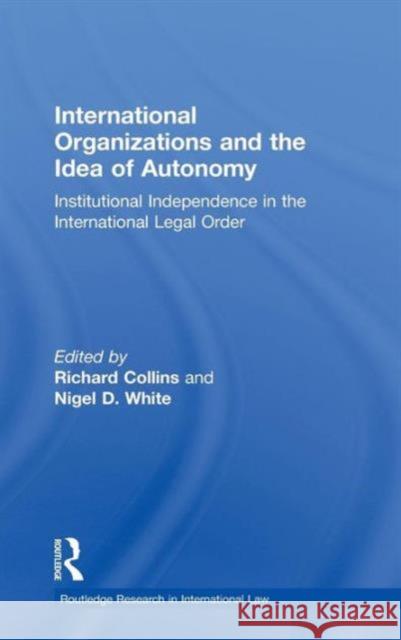International Organizations and the Idea of Autonomy: Institutional Independence in the International Legal Order » książka
International Organizations and the Idea of Autonomy: Institutional Independence in the International Legal Order
ISBN-13: 9780415550888 / Angielski / Twarda / 2011 / 446 str.
International Organizations and the Idea of Autonomy: Institutional Independence in the International Legal Order
ISBN-13: 9780415550888 / Angielski / Twarda / 2011 / 446 str.
(netto: 716,30 VAT: 5%)
Najniższa cena z 30 dni: 705,23 zł
ok. 16-18 dni roboczych.
Darmowa dostawa!
International Organizations and the Idea of Autonomy is an exploratory text looking at the idea of intergovernmental organizations as autonomous international actors. In the context of concerns over the accountability of powerful international actors exercising increasing levels of legal and political authority, in areas as diverse as education, health, financial markets and international security, the book comes at a crucial time. Including contributions from leading scholars in the fields of international law, politics and governance, it addresses themes of institutional autonomy in international law and governance from a range of theoretical and subject-specific contexts. The collection looks internally at aspects of the institutional law of international organizations and the workings of specific regimes and institutions, as well as externally at the proliferation of autonomous organizations in the international legal order as a whole. Although primarily a legal text, the book takes a broad, thematic and inter-disciplinary approach. In this respect, International Organizations and the Idea of Autonomy offers an excellent resource for both practitioners and students undertaking courses of advanced study in international law, the law of international organizations, global governance, as well as aspects of international relations and organization.
The volumes contains contributions from leading scholars in the field of international law, including Jan Wouters, Nigel D. White, Jan Klabbers, Mary Footer and Nico Krisch, who consider the idea of institutional autonomy in international law, and autonomy within international institutional law from a broad perspective.
The book engages with the idea of international organisations as autonomous entities, both in terms of control and influence over their membership and as independent actors in the international system as a whole. It considers the difficulties of theorising autonomy in a decentralised legal system, where autonomy appears as both desirable and dangerous at the same time. Related to this, the chapters question how changing perceptions of international law affect ideas of autonomy in particular institutional settings, and how, in turn, particular institutional structures or experiences may affect our perceptions of, or ambitions for change within the international system as a whole.











